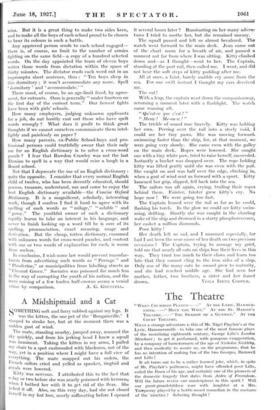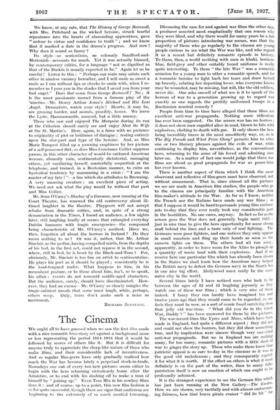The Theatre
"WHE74: CRUMMLES PLAYED---." AT THE LYRIC, HAMMER. SMITH.----" MEET THE WIFE." AT THE ST. MARTIN'S THEATRE.-" THE SHADOW OF A GUNMAN." AT TIRE COURT THEATRE.
WHAT a strange adventure is this of Mr. Nigel Playfair's at the Lyric, Hammersmith—to take one of the most famous plays of the moralizing eighteenth century, George Lillo's London Merchant ; to get it performed, with pompous exaggeration, by a company of barnstormers of the age of Nicholas Nickleby, and then modestly to assure us, on the programme, that he has no intention of making fun of the two Georges, Barnwell and Lillo !
It all turns out to be a rather learned joke, which, in spite of Mr. Playfair's politeness, might have offended poor Lillo, called the Ibsen of his age, and certainly one of the pioneers of the domestic tragedy that dates from Arden of Feversham. Will the future revive our masterpieces in this spirit ? Will our great-grandchildren roar with laughter at a Mrs. Tanqueray played by a bottle-nosed comedian in the costume of the 'nineties ? Sobering thought I We know, at any rate, that The History of George Barnwell, With Mrs. Pritchard as the wicked heroine, struck tearful repentance into the hearts of absconding apprentices, gave " ardour to virtue and confidence to truth " ; and we know that it marked a date in the drama's progress. And now ! Why does it sound so funny ?
Its style—so sententious, so solemnly Sandford-and- Mertonish—accounts for much. Yet it was actually blamed, by contemporary critics, for a language " not so dignified as that of the Buskin is usually expected to be." Again let us be careful ! Listen to this : " Perhaps our souls may salute each other in aimless vacancy hereafter, and I will smile as sweet a smile as I can without lips or cheeks to smile with, when I re- member as I pass you in the shades that I saved you from your bad angel." Does that come from George Barnwell ? No ; it is the most passionate morsel from a famous play of the 'nineties—Mr. Henry Arthur Jones's Michael and His Lost Angel. Dramatists, watch your style ! Hearts, it may be, are growing harder, and morals, possibly, looser. We leave the Lyric, Hammersmith, amused, but a little uneasy.
Those who saw and enjoyed The Marquise during its run at the Criterion should surely see and enjoy Meet the Wife at the St. Martin's. Here, again, is a farce with no pretence to originality of plot or brilliance of dialogue ; resting entirely upon the star-part and type of the heroine. And, as Miss Marie Tempest filled up a yawning emptiness by her picture of a self-possessed flirt, so does Miss Constance Collier suppress yawns, in this other character of would-be cultured American woman, absurdly vain, sentimentally dictatorial, managing others, yet vacillating herself, masterfully coquettish at the telephone, and trained, in a Bostonian manner, to calm an hysterical tendency by murmuring in a crisis : " I am the master of my fate ! "—a line which she attributes to Browning. A very amusing creature ; an excellent piece of acting. We need not ask what the play would be without that part and Miss Collier.
Mr. Scan O'Casey's Shadow of a Gunman, now running at the Court Theatre, has renewed the old controversy about ill- timed laughter in the theatre. Playgoers will not accept rebuke from dramatic critics, and, in spite of a strong denunciation in the Times, I found an audience, a few nights later, still laughing loudly at scenes that entangled everyday Dublin humours with tragic emergencies—the compound being characteristic of Mr. O'Casey's method. Have we, then, forgotten all about the horrors in Ireland ? Do they mean nothing to us ? Or was it, rather, that Mr. Arthur Sinclair, as the pedlar, having compelled mirth, from the depths of his bed, in the first act, could not repress it in the second, where, still in bed, he is beset by the Black-and-Tans ? For, obviously, Mr. Sinclair is too fine an artist to sentimentalize. He plays his part as it should be played ; consistently he is the loud-tongued loafer. What happens to him, in his recumbent posture, or to those about him, isn't, so to speak, his affair : events do not remould middle-aged characters. But the audience, surely, should have discriminated. How- ever, they had an excuse—Mr. O'Casey so closely mingles the tragic-satirical moods that some must laugh, while, perhaps, others weep. Only, tears don't make such a noise as merriment.
RICHARD JENNINGS.



























































 Previous page
Previous page